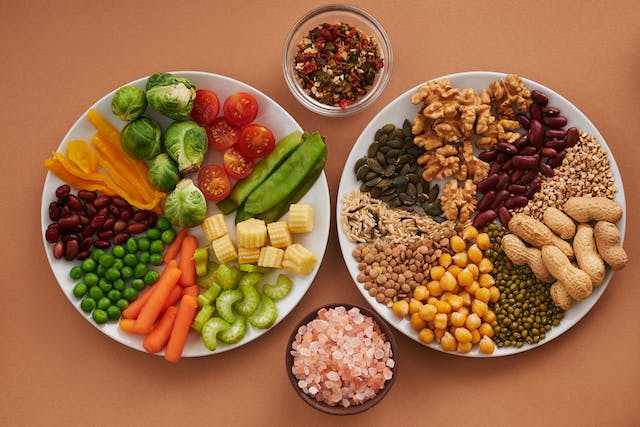As a parent, ensuring your young child receives adequate and nutritious food is crucial for their healthy development. Between the ages of 6 to 12 months, your baby experiences rapid growth and requires increased energy and nutrients. Around 6 month, your baby start to show signs of readiness for solid foods like can sit upright with minimal support, shows interest in food during family meals, can move food to the back of their mouth and swallow and seems hungry even after milk feeds. In this article, we will explore the essentials of feeding your baby during this critical stage, focusing on introducing solids alongside breastmilk.

Breastmilk: The Foundation of Nutrition
Even as your baby begins to explore solid foods, breastmilk remains a vital source of nutrition. Breastfeeding should continue alongside the introduction of solids to provide essential nutrients and support your baby’s growth. Read more about Benefits of Exclusive Breastfeeding
Introduction to Solid Foods
Around 6 months of age, it is time to introduce your baby to solid foods while continuing to breastfeed. Start with soft, easily digestible foods such as well-mashed fruits, vegetables, and porridge. These foods should be offered after breastfeeding or between nursing sessions to maintain breastfeeding frequency. Read more at When to Introduce Solid Foods to Your Baby..
 |  |
|---|
Ensuring Safe and Nutritious Meals
It’s crucial to ensure that the foods you introduce to your baby are both safe and nutritious. Wash hands thoroughly before preparing food and feeding your baby to minimize the risk of illness. Aim for a diverse diet that includes animal foods, fruits, vegetables, grains, and legumes to meet your baby’s nutritional needs. Start with single-ingredient purees:
- Iron-fortified infant cereal
- Pureed vegetables (sweet potatoes, carrots, peas)
- Pureed fruits (bananas, apples, pears)
- Pureed meat (excellent source of iron)
- Hydration: Offer water in a sippy cup alongside meals.
As the baby grows, slowly transition to thicker purees and soft mashed foods. Avoid adding salt, sugar, or honey, as these can be harmful to your baby’s developing body.
Pro Tip: Start with one food at a time and wait 3-4 days before introducing something new to watch for any allergic reactions.
Feeding Milestones
From 6 to 8 months, gradually increase the variety and quantity of solid foods, offering half a cup of soft food two to three times a day, alongside breastmilk or formula. Between 9 and 11 months, your baby can consume half a cup of food three to four times a day, along with healthy snacks.
 |  |
|---|
As your baby approaches their first birthday, they can begin eating small portions of what the family eats, provided it’s appropriately prepared. This stage focuses on increasing variety and transitioning toward three meals a day with snacks.
Sample Feeding Schedule for a 10 to 12 month old Baby
| Time | Meal | Examples of Indian Foods |
|---|---|---|
| 7:00 AM | Breakfast | Finger Millet (Ragi) Porridge, Idli |
| 10:00 AM | Snack | Seasonal Fruit like mashed banana, grated apple, or small mango pieces |
| 1:00 PM | Lunch | Rice and lentils cooked soft with vegetables like carrots, spinach, or pumpkin |
| 4:00 PM | Snack | Roasted Sweet Potato either mashed or in small chunks |
| 6:30 PM | Dinner | Soft, plain wheat bread with ghee or mashed vegetables |
| 8:00 PM | Milk (Optional) | Breast milk to soothe and prepare for bedtime |
Adapting for Non-Breastfed Babies
For parents who are not breastfeeding, it’s important to provide adequate nutrition through alternative sources. Follow a similar feeding schedule as breastfed babies, gradually increasing the quantity and variety of solid foods while ensuring your baby receives the necessary nutrients from other sources.

Every baby develops at their own pace. You can always consult with your pediatrician about your baby’s specific feeding needs and schedule. Contact your healthcare provider if:
- Your baby consistently refuses food
- Shows signs of food allergies
- Isn’t gaining weight appropriately
- Has persistent digestive issues
Tips for Success
Create a Positive Environment:
- Make mealtimes fun and relaxed
- Eat together as a family when possible
- Never force feed
- Accept mess as part of learning
- Eat a variety of healthy foods yourself to set a positive example
Read more about A Mother’s Guide to Foster Healthy Eating Habits in Children
Addressing Common Challenges:
- Food refusal is normal
- Offer rejected foods multiple times
- Be patient with the learning process
- Maintain consistent meal routines
Safety Tips
- Always supervise meals: Never leave your baby alone while eating
- Check temperature: Ensure food isn’t too hot
- Proper position: Keep baby upright while eating
- Avoid choking hazards: Cut foods into appropriate sizes
- Watch for allergic reactions: Common allergens include eggs, peanuts and dairy
- Maintain utensils cleaniness and hygiene: Ensure proper cleaning of all utensils
Conclusion
Feeding your baby from 6 to 12 months involves a delicate balance of breastmilk and the gradual introduction of solid foods. By offering a diverse and nutritious diet, you provide your baby with the essential building blocks for healthy growth and development. Every baby is unique, so it’s important to consult with a pediatrician to ensure your child’s individual nutritional requirements are being met as they progress through this transformative stage. Be patient, embrace the mess and enjoy this special time as your baby transitions to solid foods. Your guidance and encouragement during this phase will help your baby thrive and develop a lifelong appreciation for wholesome meals.